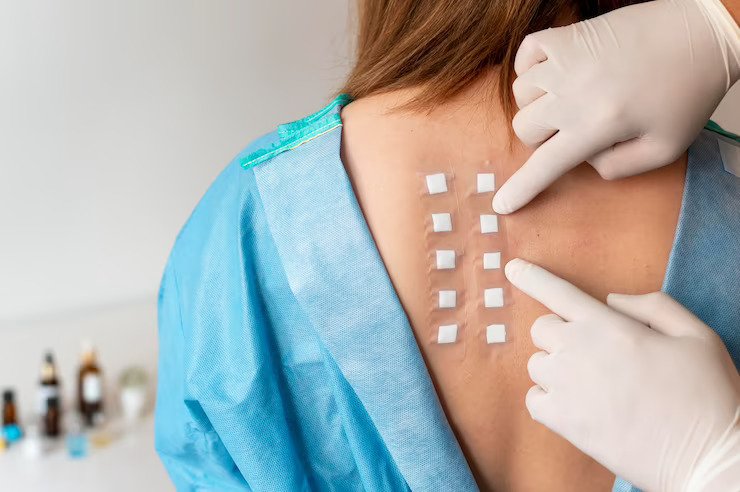Preventive Healthcare
Patch Test: Cost, Procedure, Precautions, Side Effects & Results

Table of Contents
What is a Patch Test?
Patch testing is a series of tests conducted for allergic contact dermatitis. Small amounts of different substances are placed on the skin. Over a period of 2 to 3 days, the skin's reaction to the substance is examined. The patch testing system can be a comprehensive panel of about 70-80 allergens or just a more focused panel of about 35 allergens.
Various skin allergies can result in severe reactions in one's body. Some of the symptoms of skin allergy are as follows:
- Itching
- Reddening of the skin
- Formation of red rashes
- Swelling of the area
- Formation of scabs due to scar tissue
- Flaking or peeling of the skin
Mothers who smoke during pregnancy, it has been observed, are more likely to expose their children to allergies in the future. Secondhand smoking also increases the risk of developing allergies in both children and infants.
Why is a Patch Test Done?
A patch test is done to check for potential allergens that are causing eczema or skin irritation and rashes in the patient. It is used widely to diagnose the following conditions:
- Hay fever (allergic rhinitis)
- Allergic asthma
- Dermatitis (eczema)
- Food allergies
- Penicillin allergy
- Bee venom allergy
Procedure of The Patch Test
The allergen is placed on the skin in small strips. After 48 hours, the doctor checks for the skin's reaction to the particular allergens placed on the skin. After 72-96 hours, the skin is again checked for any adverse reactions. If the skin reacts aggressively with swollen red rashes, it implies that you are allergic to that substance. If the skin remains normal, it indicates that you are not allergic to that substance.
Preparation For The Patch Test
It is generally advised to wear loose-fitting clothes. Wipe and keep the area to be tested, usually the upper back, clean from any impurities.
Inform your doctor if you have ever had severe allergic reactions, are taking any medicines that could interfere with the test results or have certain skin conditions like psoriasis or eczema.
Precautions For Patch Testing
There are certain precautions one needs to follow while the patches are on the skin in order to ensure accurate results:
- Keep the patches on your skin in the correct place. Do not tamper with any of the patches.
- Make sure to cover the area containing the patches while taking a shower or a bath. If the patches get wet, this may potentially lead to inaccurate results in the end.
- Return to your dermatologists for both of the appointments. This is because the patches may react differently with your skin after a certain amount of time has passed. Hence, it is important to make sure not to miss any of the two appointments.
- Protect your skin containing the patches from direct exposure to the sun. Wear clothes that cover the patches from sun exposure. Seek shade in the case of intense sunlight like mid-afternoon sunlight.
- Do not apply any ointments containing hydrocortisone to your skin. If you apply any oils or moisturizers containing this compound, it may severely affect the prospect of getting accurate results from the testing.
Possible Side Effects From Patch Testing
there are possibilities that the patches may irritate your skin. If you experience this, you should know that it usually clears up in a few days. People with darker skin may observe a lighter or darker spot. This also usually clears up on its own.
It may also be the cause of a flare-up in people diagnosed with psoriasis. It is quite rare to see any serious side effects from just patch testing. In rare cases, you may develop an infection or a life-long allergic reaction. The allergic reaction is usually observed within 30 minutes of starting the test.
What If Patch Test Results are Present/Absent?
The reactions can be irritating in nature in the case of those with atopic eczema, especially in the case of certain metals like nickel, chromate and cobalt, particularly perfumes and some accelerators with rubber material.
If the results are 'negative', that means it is endogenous or irritant dermatitis. It can also mean that the allergen may have been missed by not having been included in the allergen panel which was tested on the skin.
If the results are 'positive', it may mean:
- Current relevance - it can prove dermatitis currently being examined
- Past relevance - it may explain a past allergic reaction but not the current one.
- Future relevance - it may cause an allergic reaction in the future
- Uncertain relevance - this can morph once you inspect your personal care or job-related products which you may encounter on a daily basis.
- Potential cross-reaction - If you have had a positive reaction to hair dye allergen, then you may also react positively to other products that contain parabens or synthetic cloth dyes.
Cost of Patch Testing in India
Patch testing costs a moderate amount in India. Patch testing can significantly improve the quality of your life. It can be quite exhausting when one does not know what exactly is causing such adverse reactions to the skin. Once the allergens are successfully identified, they can be removed or avoided from your environment.
Patch testing cost in India is Rs. 2000 to Rs. 3000 approximately. This can vary significantly depending on where you decide to get the patch testing done.




























